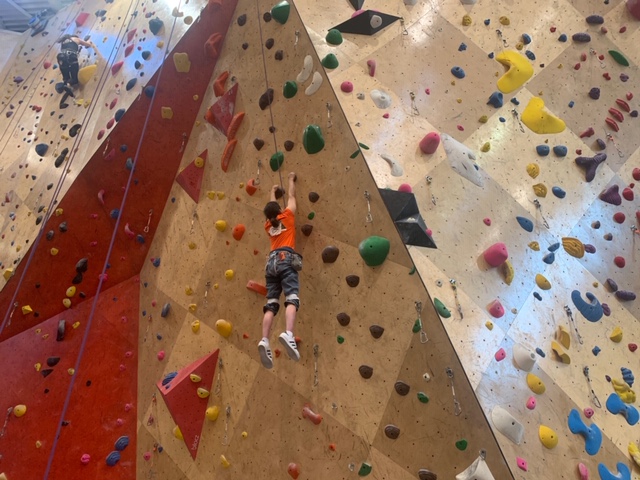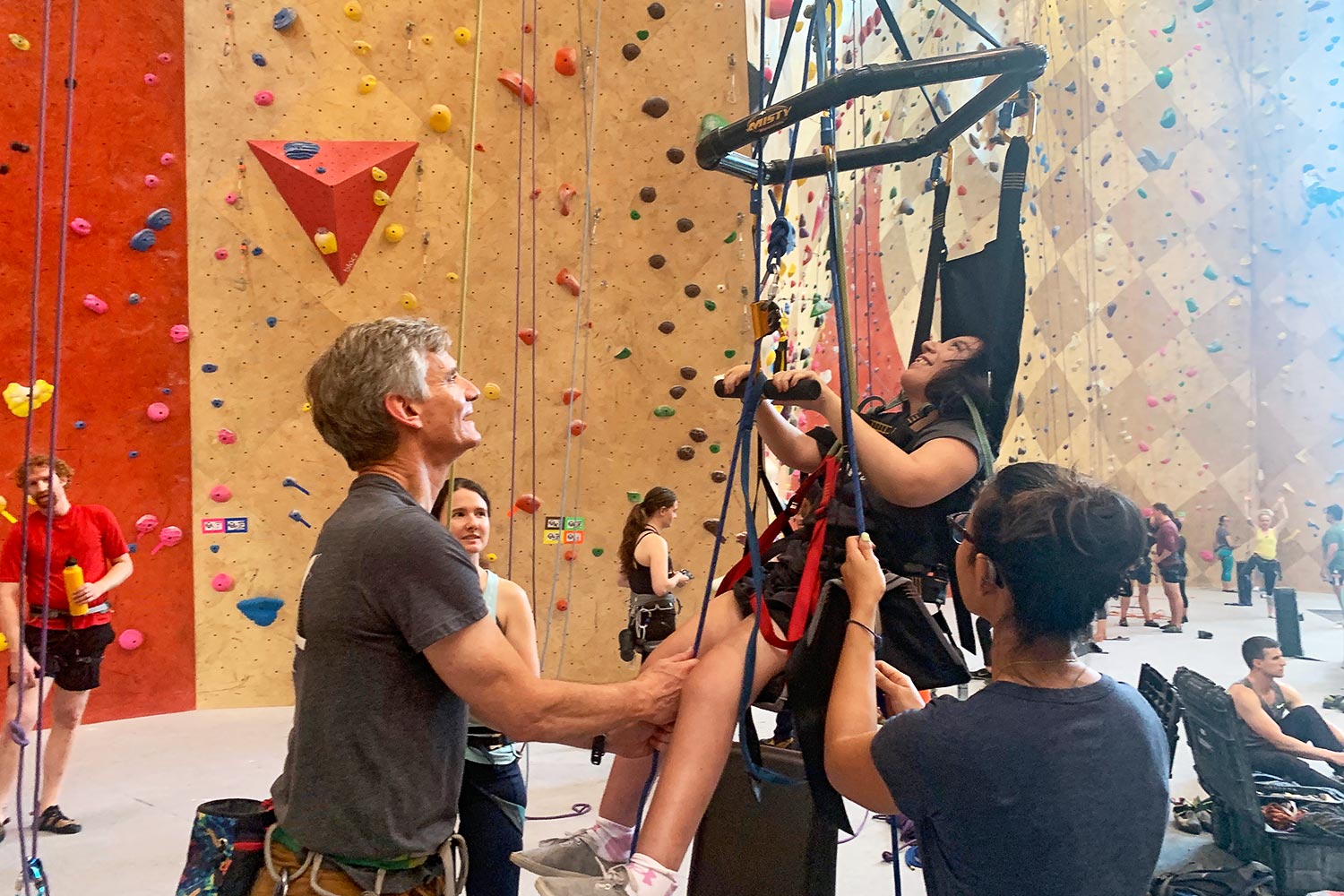The four members of the Chicago Red Stars on the U.S. Women’s National Team have arrived back to the states victorious. Now, another local quartet is heading abroad for an international tournament.
Four climbers from Adaptive Climbing Group Chicago — Molly Ferris, Manasi Deshpande, Ryan Juguan, and Montoo Baruah — will compete in the World Paraclimbing Championship in Briançon, France on July 16 and 17. There, the foursome will face off against their peers by category of disability. Some have amputations, others climb seated or do so with visual impairments.
Like other paraclimbers, the four athletes competing this week must make adjustments to accommodate their disability while climbing. For example, Ferris, 27, was born without fingers on her right hand; when she climbs, she covers her wrist in athletic tape so as not to damage the delicate skin there. While gathering “beta,” or intelligence on the best route, she takes note of handholds with too-small surfaces and avoids them. Otherwise, there isn’t much she has to modify.
“I think [climbing is] the most adaptive sport,” she says. “It’s perfect for people with disabilities."
Because of all the gear rock climbing necessitates, that might not be intuitive at first blush. However, since equipment like harnesses, carabiners, and special shoes are already necessary, adding a few extra pieces of adaptive gear typically isn’t that difficult.
Deshpande, 33, says climbing wasn’t even on her radar until recently, much less the prospect of squaring off against the world’s best paraclimbers.
“I’d worked out, but I never had a sport,” she says.
That changed two years ago, when a friend invited her to attend an event at Maggie Daley Park. There, she learned about ACG’s Wednesday sessions at Brooklyn Boulders (100 S. Morgan St.).

Deshpande has a neurological condition, uses a wheelchair, and climbs with her upper body only. The first time she came to Brooklyn Boulders, she used a 2:1 belay, meaning she used both a belayer — the person on the ground who holds the end of the climber’s rope — and a second volunteer, clipped in to take some of her weight off.
But her talent was swiftly apparent. Within months, she’d ditched the second belayer and qualified for Nationals. Now, not only is she headed for Worlds, she’s strengthened her upper body and core enough to do an archer pull-up, an advanced variation performed with one arm extended.
Deshpande admits to some pre-competition anxiety, but overall, she says climbing has made her not only stronger physically but also calmer mentally.
“Sometimes I come here stressed from the day and it all kind of melts away,” Deshpande says. “It’s also just fun to have a different way of achieving besides work.”
The day before their flights left for France, Deshpande, Ferris, and several other climbers gathered for their regular Wednesday workout. Lead volunteer Al Schiewe — a 61-year-old electrical engineer from Lombard who’s been climbing for 25 years — hauled out two tubs of equipment to set up for the athletes.
Schiewe has been heading up the Chicago outpost of ACG since it launched in 2015 as an extension of a NYC-based organization for paraclimbers. At first, the Chicago group was a veterans program in collaboration with what was then the Rehabilitation Institute of Chicago (now Shirley Ryan AbilityLab). But not long after, they opened it to the larger community, utilizing a network of volunteers. Each climber is paired with a volunteer ahead of time, so no one is left hanging, figuratively or literally.
“We won’t tell anybody they can’t climb with us — we’ll figure out a way to do something,” Schiewe says.
.jpg)
This week, he demonstrates to a new volunteer the pulley system that lifts climbers like Christina Talavera, 28, who has cerebral palsy. Talavera has been climbing for more than four years, using a seat suspended by ropes and a pentagon-shaped PVC device called an ARC harness. As she pushes down on a handle, volunteers tighten the slack, until she’s hoisted nearly to the top of the gym’s 50-foot ceiling. By the time Talavera gets down, she’s sweating from the arm workout.
Also competing in Worlds this year, Juguan, 29, says that competitive sports have been especially beneficial to his health. While attending the University of Illinois, he competed on the school's wheelchair basketball team. Post-graduation, he found that the kicking and pulling motions of rock climbing helped strengthen the muscles surrounding his genetically brittle bones and improved his balance.
After heading to Worlds last year and not placing as high as he’d have liked, Juguan spent the year training to strengthen his legs, building flexibility and focus though yoga, and working especially hard on his fingers. Though incentivized by his desire to represent the USA abroad, Juguan says his passion is fueled by more than competitiveness.
“I’m always wanting to get better, but for me, it’s all about the love of climbing,” he says. “It’s a big part of my life now, and that’s what keeps me going.”
The finals of the IFSC Paraclimbing World Championships will stream live on July 17. In addition to the Wednesday night climbs, ACG Chicago has a children’s climbing session one Saturday a month and will host climbs at Maggie Daley Park from 11 a.m. to 1:30 p.m. on Sunday, July 21, and Saturday, August 17.




